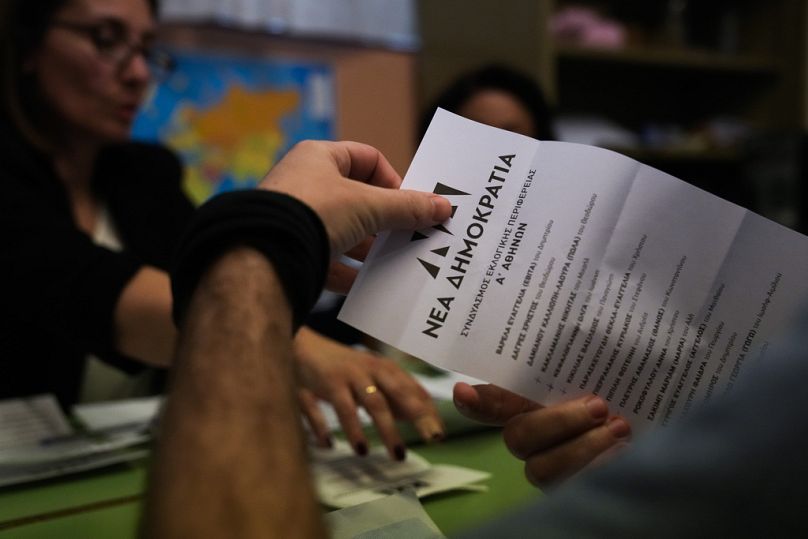The winners, the losers, the parties making a comeback, and what happens next: we've got all those topics covered.
1. PM Kyriakos Mitsotakis surges ahead with a big win
Prime Minister Kyriakos Mitsotakis and his conservative New Democracy party led Greece's election by a wide margin late Sunday night, according to partial official results.
Mitsotakis, a 55-year-old Harvard-educated former banking executive, won the 2019 elections on a promise of business-oriented reforms and has vowed to continue tax cuts, boost investments and bolster middle-class employment.
“(The exit polls) show a clear victory for New Democracy and a clear renewal of the mandate to continue the major changes sought by Greek society,” said government spokesman Akis Skertsos.
Mitsotakis had been steadily ahead in opinion polls in the runup to the election. But his popularity took a hit following a 28 February rail disaster that killed 57 people after an intercity passenger train was accidentally put on the same rail line as an oncoming freight train. It was later revealed that train stations were poorly staffed and safety infrastructure broken and outdated.
The last polls before voting indicated that New Democracy was only likely to have a slender six percentage point lead over their opponents; but with two-thirds of the vote counted on Sunday night, New Democracy had 40% of the vote, while rivals Syriza trailed with 20% of the vote.
2. What comes next? Another election
Greece's new electoral law of proportional representation makes it difficult for any party to win an outright majority in the 300-member parliament to form a government on its own, meaning Mitsotakis might have needed to find a coalition partner.
However, there are advantages to not doing this, and New Democracy has indicated it would prefer to seek a clear win in a second round of voting and be able to govern on its own.
“We have said that we want to govern outright because that would ensure stability and the way forward. So we have the right to ask the Greek people for that in the next election,” Public Order Minister Takis Theodorikakos said on Skai television shortly after polls closed Sunday evening.
If a second election is held, likely in late June or early July, Greece's election law will change again, shifting to a system that rewards the leading party with 50 bonus seats and making it easier for it to win a parliamentary majority.
New Democracy sees its best route to government in a second election, expecting to come out on top again and claim the winner's bonus seats.
Before Sunday's votes, Syriza said it would try to form a coalition government only if it came first. The socialist Pasok party said it wouldn't cooperate with either New Democracy or Syriza; while the Communist KKE said they wouldn't cooperate with other parties to form a coalition either.
3. Result is a disappointment for Syriza
There's no mistaking that this election is a major disappointment for Syriza, and for former prime minister Alexis Tsipras. He lead the country during some of the most tumultuous years of the financial crisis, but has struggled to regain the wide support he enjoyed when he was swept to power in 2015 on a promise of reversing bailout-imposed austerity measures.
"The games have both wins and losses. The election result is extremely negative for Syriza," Tsipras said in a Sunday evening statement.
"A while ago I contacted Mr Mitsotakis and he congratulated him on his victory," he said.
A 48-year-old civil engineering graduate, Tsipras transformed former minnow Syriza into Greece's dominant left-of-center grouping. He oversaw a painful new bailout deal during his first term in office, and his second term from 2015-2019, saw rapprochement with bailout lenders and a historic agreement to normalise ties with neighboring North Macedonia. In this campaign he pledged to reverse some previous reforms, expand welfare and legalise same-sex marriage.
The only prefecture that Syriza has won is one where half the voters are from Greece's Muslim majority, close to the border with Turkey.
4. Greeks registered overseas were allowed to vote for the first time
Greek voters around the world turned out in high numbers at the election, the first time they had been allowed to register to vote overseas.
According to the Ministry of Interior some 18,203 people cast their ballots in 35 countries, which represents 79.6% of registered overseas voters.
Most of the polling stations were in Germany -- in 15 cities -- and the Greek Ambassador in Berlin Mara Marinaki described it as a "solid foundation so that this process, the participation, becomes even stronger in the future."
There were also polling stations in Italy, France, Britain and Belgium, as well as in Canada and the USA, with one Greek diplomat in Brussels calling the new voting process as "a historic day."
5. The party that governed Greece for almost three decades made a modest comeback
The party that governed Greece for almost three decades made a modest comeback in Sunday's vote.
Socialist Pasok, lead by Nikos Androulakis increased their vote by 40%. The figures are still nothing like they were during the 80s, 90s and 00s, but going from 8% at the last election to 11.5% in this election is quite a milestone for the party.
Once the dominant force in Greek politics, Pasok was superseded by Syriza during the financial crisis.
Androulakis, who has been an MEP in Brussels for the last seven years, has a poor relationship with prime minister Mitsotakis -- whom he accuses of covering up the wiretapping scandal which targeted Androulakis himself, among others.
But he's also on bad terms with Tsipras, accusing him of trying to poach Pasok voters.















